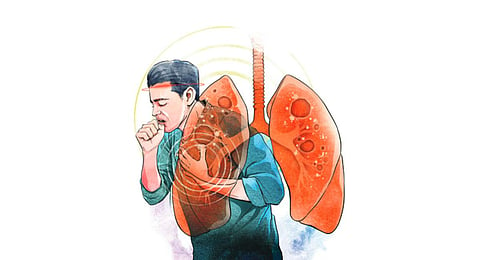

NEW DELHI: Expressing its concerns over "a sense of complacency" within the Union Health Ministry and the centre in implementing the TB elimination programme, a parliamentary panel has said that the shifting of responsibility to non-governmental organisations "eventually may impede the overall progress" of TB eradication programme.
In its 149th report in Parliament, the Department-related Parliamentary Standing Committee on Health and Family Welfare said it “believes that the task at hand is enormous and time is short to meet the End TB target by 2025.”
India has set the target of eliminating TB by 2025, five years ahead of the global deadline of 2030.
As the government is working in mission mode, the Committee recommended that robust monitoring and evaluation mechanisms be implemented to track progress towards TB elimination goals, it added.
Appreciating the immense potential of the Ni-Akshay Mitra Initiative in enhancing TB control efforts in India and alleviating the 58 socio-economic burdens of TB disease, the Committee, however, said that the adoption of TB patients under Pradhan Mantri TB Mukt Bharat Abhiyaan (PMTBMBA) to eradicate TB by 2025, the Ni-Akshay adoption model cannot be considered as the mainstay to fight against TB.
“The Committee further expresses its concerns over a sense of complacency within the Ministry and the Government organisation responsible for implementing the TB elimination programme due to a shift in their responsibility to non-governmental organisations, which eventually may impede the overall progress,” it added.
It thus suggested that the government establish a robust selection process for Ni-Akshay Mitra and implement effective monitoring mechanisms to ensure their diligent fulfilment of responsibilities.
Under the Ni-kshay Mitra initiative, which was launched by President Droupadi Murmu last year, community support is provided to TB patients so that they can be adopted and cared for by an individual, elected representatives or institutions.
As per WHO Global TB Report 2022, around one-quarter of the world’s population – two billion - is latently infected with TB, and it is the 13th leading cause of death and the second leading infectious killer after COVID-19. India contributes approximately one-fourth of the international cases, roughly 25 lakhs out of 1.05 crores globally.
The panel said that over the last five years, TB disease has been more commonly seen in the age groups of 15-24 years and 25-34 years than in other age groups.
As the health of the young population is central to the nation's health, it suggested a robust population-based approach be worked out to address their socio-economic conditions, healthy lifestyle and preventive strategies to have a holistic approach to the TB elimination drive.
“The Committee believes that as the health of the young population is central to the nation's health, a robust population-based approach should be worked out to address their socio-economic conditions, healthy lifestyle and preventive strategies to have a holistic approach to the TB elimination drive.”
It also said that it is imperative to conduct a survey on the financial impact of TB in India, which would give a realistic picture of socio-economic status as well as the financial burden of TB disease on a family. “Such surveys can also be combined with other health surveys on a national level to assess the catastrophic costs related to TB disease. The government may also explore avenues to integrate such surveys with the Ni-kshay portal.”
Keeping in view the large population of India and the target of achieving TB elimination by 2025, the panel suggested that there is a need to significantly increase the rate of TB case finding by taking various steps, including aggressive use of X-rays for faster and confirming TB diagnosis; scaling up molecular laboratories to block levels; and holistic implementation of intensified case finding in OPDs of all healthcare facilities.
It also suggested contact tracing, involvement of the private sector and an increase in awareness programmes.
In view of higher prices of anti-TB drugs, the Committee suggested that the government may collaborate with pharmaceutical companies to negotiate prices for TB drugs through bulk purchasing or licensing agreements.
It said that it has come to their notice that some drugs used for treating Drug-Resistant TB are still unavailable to private practitioners and recommended establishing an arrangement with fixed accountability to maintain a regular supply of quality TB medications to all parts of the country.
“Moreover, the government may encourage the domestic production of generic TB drugs with infrastructural support, streamlined regulatory processes, and tax incentives to reduce dependency on imported medicines,” it added.
The Committee also pushed for newly developed skin tests to be utilised extensively for TB preventive treatment and conducted for close contact with TB patients and risk groups like diabetes, alcoholics, etc. The validation of this test for children less than 18 years old may be expedited so that the TB preventive treatment may be given at the infection level itself.